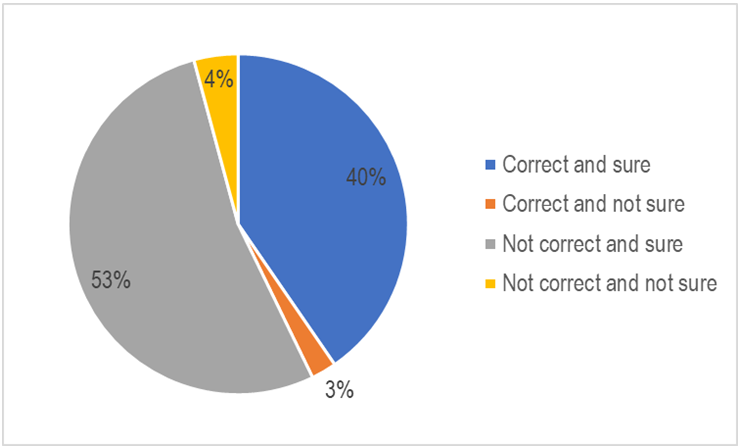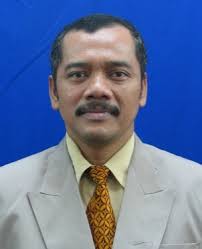Misconceptions of biology education students in Biochemistry Course during the COVID-19 pandemic
DOI:
https://doi.org/10.22219/jpbi.v7i2.17093Abstract
Misconception is one of the main problems in biology education which has the potential to increase when course is packaged in a e-learning. This study aimed to map the level of the biochemistry concept accuracy of students who take online biochemistry lectures. This quantitative research involved Biology Education students, FKIP UMM as research subjects. Online lectures were conducted for ten meetings using ELMU UMM. At the 11st meeting, a concept accuracy test was carried out. The data were then analyzed using descriptive statistics. The result, 64% of students have a low level of concept accuracy, 14% moderate, and 0% good. Therefore, online learning packaging needs to be optimized so that the percentage accuracy of the biochemical concepts of students is maximized.
Downloads
References
Al-Kumaim, N. H., Alhazmi, A. K., Mohammed, F., Gazem, N. A., Shabbir, M. S., & Fazea, Y. (2021). Exploring the impact of the COVID-19 pandemic on university students’ learning life: An integrated conceptual motivational model for sustainable and healthy online learning. Sustainability, 13(5), 2546. https://doi.org/10.3390/su13052546
Atmojo, A. E. P., & Nugroho, A. (2020). EFL classes must go online! Teaching activities and challenges during COVID-19 pandemic in Indonesia. Register Journal, 13(1), 49–76. https://doi.org/10.18326/rgt.v13i1.49-76
Azhari, B., & Fajri, I. (2021). Distance learning during the COVID-19 pandemic: School closure in Indonesia. International Journal of Mathematical Education in Science and Technology, 1–21. https://doi.org/10.1080/0020739X.2021.1875072
Barbour, M. K., Siko, J., Gross, E., & Waddell, K. (2013). Virtually unprepared: Examining the preparation of K-12 online teachers. In Teacher Education Programs and Online Learning Tools: Innovations in Teacher Preparation (pp. 60–81). https://doi.org/10.4018/978-1-4666-1906-7.ch004
Chu, D. K., Akl, E. A., Duda, S., Solo, K., Yaacoub, S., Schünemann, H. J., Chu, D. K., Akl, E. A., El-harakeh, A., Bognanni, A., Lotfi, T., Loeb, M., Hajizadeh, A., Bak, A., Izcovich, A., Cuello-Garcia, C. A., Chen, C., Harris, D. J., Borowiack, E., … Schünemann, H. J. (2020). Physical distancing, face masks, and eye protection to prevent person-to-person transmission of SARS-CoV-2 and COVID-19: a systematic review and meta-analysis. The Lancet, 395(10242), 1973–1987. https://doi.org/10.1016/S0140-6736(20)31142-9
Dikmenli, M. (2010). Misconceptions of cell division held by student teachers in biology: A drawing analysis. Scientific Research and Essay, 5(2), 235–247. https://academicjournals.org/article/article1380539915_Dikmenli.pdf
Duda, H. J., Wahyuni, F. R. E., & Setyawan, A. E. (2020). Plant biotechnology: Studying the misconception of biology education students. AIP Conference Proceedings, 020101. https://doi.org/10.1063/5.0030449
Elisa, A., Sotos, C., Vanhoof, S., Noortgate, W. V. D., & Onghena, P. (2007). Students ’ misconceptions of statistical inference : A review of the empirical evidence from research on statistics education. 2, 98–113. https://doi.org/10.1016/j.edurev.2007.04.001
Erman, E. (2017). Factors contributing to students’ misconceptions in learning covalent bonds. Journal of Research in Science Teaching, 54(4), 520–537. https://doi.org/10.1002/tea.21375
Fauzi, A., & Fariantika, A. (2018). Courses perceived difficult by undergraduate students majoring in biology. Biosfer: Jurnal Pendidikan Biologi, 11(2), 78–89. https://doi.org/10.21009/biosferjpb.v11n2.78-89
Gunawan, G., Suranti, N. M. Y., & Fathoroni, F. (2020). Variations of models and learning platforms for prospective teachers during the COVID-19 pandemic period. Indonesian Journal of Teacher Education, 1(2), 61–70. https://journal.publication-center.com/index.php/ijte/article/view/95/48
Halim, L., Yong, T. K., & Meerah, T. S. M. (2014). Overcoming students’ misconceptions on forces in equilibrium: An action research study. Creative Education, 05(11), 1032–1042. https://doi.org/10.4236/ce.2014.511117
Halmo, S. M., Sensibaugh, C. A., Bhatia, K. S., Howell, A., Ferryanto, E. P., Choe, B., Kehoe, K., Watson, M., & Lemons, P. P. (2018). Student difficulties during structure–function problem solving. Biochemistry and Molecular Biology Education, 46(5), 453–463. https://doi.org/10.1002/bmb.21166
Kurniawan, M. A., Rahayu, S., Fajaroh, F., & Almuntasheri, S. (2020). Effectiveness of dual situated learning model in improving high school students’ conceptions of chemistry equilibrium and preventing their misconceptions. Journal of Science Learning, 3(2), 99–105. https://doi.org/10.17509/jsl.v3i2.22277
Martha, A. S. D., Junus, K., Santoso, H. B., & Suhartanto, H. (2021). Assessing undergraduate students’ e-learning competencies: A case study of higher education context in Indonesia. Education Sciences, 11(4), 189. https://doi.org/10.3390/educsci11040189
Mermelstein, C., & Costa, M. L. (2017). Analysis of undergraduate cell biology contents in Brazilian public universities. 41, 361–368. https://doi.org/10.1002/cbin.10720
Mohammad, O. (2017). Recent trends in biochemistry and biotechnology. J Biochem Biotech, 1(1), 6–7. https://doi.org/10.35841/Biochemistry-Biotechnology.1000104
Mok, K. H., Xiong, W., & Rahman, H. N. B. A. (2021). COVID-19 pandemic’s disruption on university teaching and learning and competence cultivation: Student evaluation of online learning experiences in Hong Kong. International Journal of Chinese Education, 10(1), 221258682110070. https://doi.org/10.1177/22125868211007011
Qonita, R., A’tourrohman, M., Ulwiyah, U., & Wijayanti, E. (2021). Student learning difficulties in online biochemistry practicum: An experiences during COVID-19. Bioeduscience, 5(1), 74–79. https://doi.org/10.22236/j.bes/515597
Queloz, A. C., Klymkowsky, M. W., Stern, E., Hafen, E., & Kohler, K. (2017). Diagnostic of students ’ misconceptions using the Biological Concepts Instrument ( BCI ): A method for conducting an educational needs assessment. Plos One, 12(5), 1–18. https://doi.org/10.1371/journal.pone.0176906
Raharjo, D., Ramli, M., & Rinanto, Y. (2019). Diagnostic test assessment on protist misconception. JPBI (Jurnal Pendidikan Biologi Indonesia), 5(2), 335–344. https://doi.org/10.22219/jpbi.v5i2.7685
Rajhans, V., Memon, U., Patil, V., & Goyal, A. (2020). Impact of COVID-19 on academic activities and way forward in Indian optometry. Journal of Optometry, 13(4), 216–226. https://doi.org/10.1016/j.optom.2020.06.002
Sesli, E., & Kara, Y. (2012). Development and application of a two-tier multiple-choice diagnostic test for high school students’ understanding of cell division and reproduction. Journal of Biological Education, 46(4), 214–225. https://doi.org/10.1080/00219266.2012.688849
Singhal, T. (2020). A review of Coronavirus Disease-2019 (COVID-19). The Indian Journal of Pediatrics, 87(4), 281–286. https://doi.org/10.1007/s12098-020-03263-6
Susanti, R. (2018). Misconception of biology education student of teacher training and education of Sriwijaya University to the concept of photosynthesis and respiration. Journal of Physics: Conference Series, 1022, 012056. https://doi.org/10.1088/1742-6596/1022/1/012056
Suwono, H., Prasetyo, T. I., Lestari, U., Lukiati, B., Fachrunnisa, R., Kusairi, S., Saefi, M., Fauzi, A., & Atho’Illah, M. F. (2021). Cell Biology Diagnostic Test (CBD-Test) portrays pre-service teacher misconceptions about biology cell. Journal of Biological Education, 55(1), 82–105. https://doi.org/10.1080/00219266.2019.1643765
Thibaut, D., & Schroeder, K. T. (2020). A case‐based learning approach to online biochemistry labs during COVID-19. Biochemistry and Molecular Biology Education, 48(5), 484–485. https://doi.org/10.1002/bmb.21408
Tompo, B., Ahmad, A., & Muris, M. (2016). The development of discovery-inquiry learning model to reduce the science misconceptions of junior high school students. International Journal of Environmental and Science Education, 11(12), 5676–5686. http://www.ijese.net/makale_indir/732
Üce, M., & Ceyhan, İ. (2019). Misconception in chemistry education and practices to eliminate them: Literature analysis. Journal of Education and Training Studies, 7(3), 202–208. https://doi.org/10.11114/jets.v7i3.3990
Usman, M. (2018). Biochemistry and Molecular Biology is the major tool for the development of health and basic need of daily life, in the developing countries in the world. EuroScicon Congress on Biochemistry, Molecular Biology & Allergy, 4. https://doi.org/10.21767/2471-8084-C4-018
Wu, Y. C., Chen, C. S., & Chan, Y. J. (2020). The outbreak of COVID-19: An overview. Journal of the Chinese Medical Association, 83(3), 217–220. https://doi.org/10.1097/JCMA.0000000000000270
Yates, T. B., & Marek, E. (2014). Teachers teaching misconceptions: a study of factors contributing to high school biology students’ acquisition of biological evolution-related misconceptions. Evolution: Education and Outreach, 7, 7. https://doi.org/10.1186/s12052-014-0007-2
Yusuf, B. N. (2020). Are we prepared enough? A case study of challenges in online learning in a private higher learning institution during the COVID-19 outbreaks. Advances in Social Sciences Research Journal, 7(5), 205–212. https://doi.org/10.14738/assrj.75.8211

Downloads
Published
Issue
Section
License

This work is licensed under a Creative Commons Attribution-ShareAlike 4.0 International License.
Authors who publish with JPBI (Jurnal Pendidikan Biologi Indonesia) agree to the following terms:
- For all articles published in JPBI, copyright is retained by the authors. Authors give permission to the publisher to announce the work with conditions. When the manuscript is accepted for publication, the authors agree to automatic transfer of the publishing right to the publisher.
- Authors retain copyright and grant the journal right of first publication with the work simultaneously licensed under a Creative Commons Attribution-ShareAlike 4.0 International License that allows others to share the work with an acknowledgment of the work's authorship and initial publication in this journal.
- Authors are able to enter into separate, additional contractual arrangements for the non-exclusive distribution of the journal's published version of the work (e.g., post it to an institutional repository or publish it in a book), with an acknowledgment of its initial publication in this journal.
- Authors are permitted and encouraged to post their work online (e.g., in institutional repositories or on their website) prior to and during the submission process, as it can lead to productive exchanges, as well as earlier and greater citation of published work (See The Effect of Open Access).

This work is licensed under a Creative Commons Attribution-ShareAlike 4.0 International License.


















